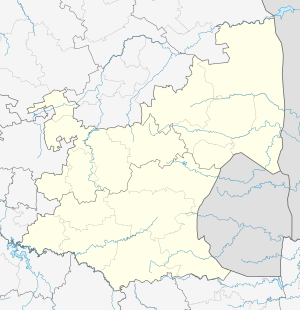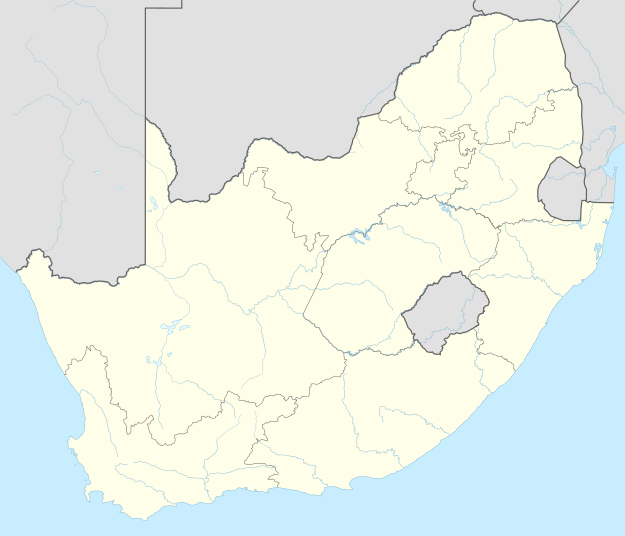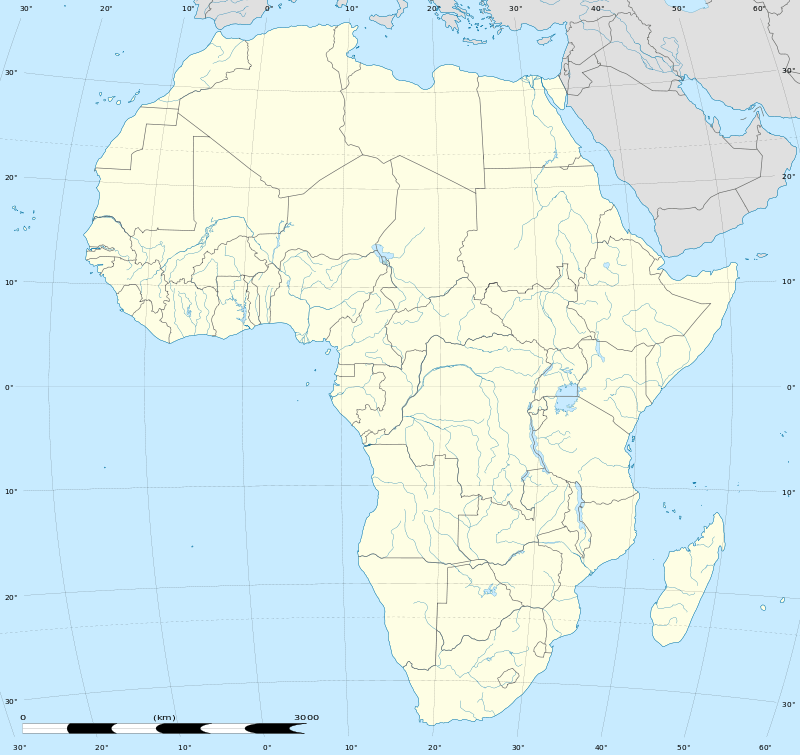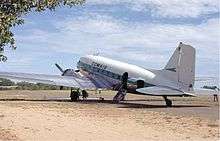Skukuza
| Skukuza | |
|---|---|
|
Camp entrance at Skukuza | |
 Skukuza  Skukuza  Skukuza
| |
| Coordinates: 24°59′45″S 31°35′31″E / 24.99583°S 31.59194°ECoordinates: 24°59′45″S 31°35′31″E / 24.99583°S 31.59194°E | |
| Country | South Africa |
| Province | Mpumalanga |
| District | Ehlanzeni |
| Municipality | Mbombela |
| Government | |
| • Type | Ward 39 |
| • Councillor | Dudu Tryphinah Nkosi |
| Area[1] | |
| • Total | 4.98 km2 (1.92 sq mi) |
| Population (2011)[1] | |
| • Total | 1,599 |
| • Density | 320/km2 (830/sq mi) |
| Racial makeup (2011)[1] | |
| • Black African | 83.9% |
| • Coloured | 1.6% |
| • Indian/Asian | 0.1% |
| • White | 14.4% |
| First languages (2011)[1] | |
| • Tsonga | 58.0% |
| • Swazi | 9.7% |
| • Afrikaans | 9.5% |
| • English | 7.7% |
| • Other | 15.2% |
| PO box | 1350 |
Skukuza is the administrative headquarters and main camp of the Kruger National Park in South Africa, it is the largest rest camp in South Africa and also the largest rest camp in the Kruger National Park. It is situated on the southern banks of the Sabie River in Mpumalanga Province. The name "Skukuza" was given by the local Tsonga people as a nickname for James Stevenson-Hamilton. It could be translated as 'to sweep', as Stevenson-Hamilton was perceived as to sweep the land clean of poachers and other criminals operating in the area. Skukuza was a proud home of the Tsonga people until 1905, when the Colonial Government evicted them and resettled them in villages around Hazyview, where there was already a large concentration of Tsonga people. [2]
History
Skukuza was a large, densely populated Tsonga chiefdom under the authority of Chief Ngomane and his people. The Tsonga people of Skukuza were great big game hunters, they hunted Africa's big five as well as smaller animals. They used the Sabie River for fishing. The land where the Skukuza camp is situated was chief Ngomane's palace (eHubyeni) and he used to conduct tribal meetings there. When the government decided to establish a national park during the late 1800s and early 1900s, Skukuza was identified as a potential site, firstly because of its natural beauty, the mighty Sabie River flowing nearby, and because of its abundance of Africa's big five, leopard, lion, buffalo, rhino and elephant were present in large numbers compared to other sites. The government moved the Tsonga people to villages around Bushbuckridge and Hazyview, where there were large concentrations of Shangaan people.
The park's warden was James Stevenson-Hamilton, a good friend of the Tsonga people and fluent in Tsonga language. He was very familiar with Tsonga culture and he was taught animal hunting and tracking skills by the Tsonga. Stevenson-Hamilton was then given a new name by the Tsonga, they named him Skukuza, meaning 'new broom' or someone who turn things upside down, inside out.
Facilities
It has a number of historical sites including 3 museums and a library, besides a camp centre consisting of shops and restaurants. The Selati Train restaurant is situated on an old train platform on the eastern verge of the camp.
From the main reception a visitor can organize game drives, bush braais and guided walks in Kruger. Besides the camp basics, Skukuza also has 2 swimming pools, a golf course, library, minor motor repairs, police station, post office and even a bank. These shops and facilities are surrounded by different sized huts, larger guest houses as well as a rustic camping terrain.
Nearby the camp is a nursery where plants native to the region can be viewed and purchased. These are mostly suited to a similarly hot climate.
There is an airport 5 km away, called Skukuza Airport, with direct flights from Cape Town and Johannesburg on a daily basis. SAA Express operates two daily from Cape Town and OR Tambo, as well as two daily flight from Skukuza to both OR Tambo and Cape Town International.
Game viewing
Skukuza is located in the southern part of Kruger and is the most popular and accessible camp, and one of the best for game viewing. In the vicinity of the camp all of the African big five can be found as well as other recognisable and exciting animals. The nearby Lake Panic hide 24°58′52″S 31°33′58″E / 24.98111°S 31.56611°E offers a vantage point of a water body from dense woodland.
The camp itself overlooks the Sabie River where elephants sometimes congregate. The stretch right opposite Skukuza is the home to a number of hippos. The trees along the river are home to very loud chacma baboons, while the piercing calls of greater galagos are heard at dawn and dusk. Wahlberg's epauletted fruit bats are easily seen under the verges of some thatched roofs. Some of these have been fitted with radio transmitters to study their feeding patterns.
Accommodation
Accommodation at Skukuza vary from small, but comfortable, bungalows to large guesthouses, suitable for tour groups. Each house has an outside braai (barbecue area) and mosquito protection. The large camping terrain has sites for caravans, motor homes and tents; campers share the ablutions, cooking and wash-up facilities. Staying at Skukuza means you are allowed to use facilities such as the swimming pools and watching free movies at the outdoor cinema.
Gallery
 Part of the Waterkant guesthouse
Part of the Waterkant guesthouse A group of lions on an early evening prowl on the H1-2 road just east of Skukuza
A group of lions on an early evening prowl on the H1-2 road just east of Skukuza Old train bridge over the Sabie River
Old train bridge over the Sabie River Sabie River near Skukuza
Sabie River near Skukuza- The Stevenson-Hamilton library in Skukuza
 A Comair Douglas DC-3 at Skukuza in 1973
A Comair Douglas DC-3 at Skukuza in 1973
References
- 1 2 3 4 "Sub Place Skukuza". Census 2011.
- ↑ Raper, P. E. (1989). Dictionary of Southern African Place Names. Jonathan Ball Publishers. p. 406. ISBN 978-0-947464-04-2 – via Internet Archive.
.svg.png)